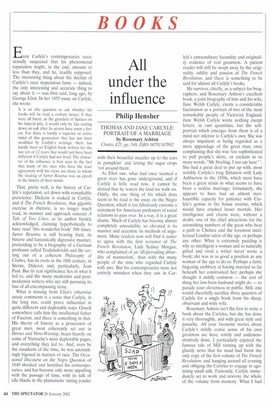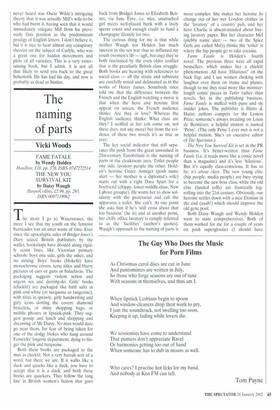All under the influence
Philip Hensher
THOMAS AND JANE CARLYLE: PORTRAIT OF A MARRIAGE by Rosemary Ashton Chatto, £25, pp. 548, ISBN 00701167092 Even Carlyle's contemporaries occasionally suspected that his phenomenal reputation might, in the end, amount to less than they, and he, readily supposed. The interesting thing about the decline of Carlyle's once stupendous fame — indeed, the only interesting and accurate thing to say about it — was first said, long ago, by George Eliot. In her 1855 essay on Carlyle, she wrote:
It is an idle question to ask whether his books will be read a century hence: if they were all burnt, as the grandest of Suttees on his funeral pile, it would only be like cutting down an oak after its acorns have sown a forest. For there is hardly a superior or active mind of this generation that has not been modified by Carlyle's writings; there has hardly been an English book written for the last ten or 12 years that would not have been different if Carlyle had not lived. The character of his influence is best seen in the fact that many of the men who have the least agreement with his views are those to whom the reading of Sartor Resartus was an epoch in the history of their minds.
That, pretty well, is the history of Carlyle's reputation, set down with remarkable prescience. Dickens is soaked in Carlyle, and if The French Revolution, that gigantic exercise in rhetoric, is no longer much read, its manner and approach saturate A Tale of Two Cities, as its author frankly acknowledged, claiming hyperbolically to have read 'this wonderful book' 500 times. Sartor Resartus is still bearing fruit; its bizarre and fantastically digressive manner, pretending to be a biography of a German professor called Teufelsdr8ckh and the setting out of a coherent Philosophy of Clothes, has its roots in the 18th century, in Sterne, Diderot, and, particularly, Jean Paul. But its real significance lies in what it led to, and the many modernist and postmodernist writers who are still pursuing its line of all-encompassing irony.
What is missing from Eliot's otherwise astute comments is a sense that Carlyle, in the long run, could prove influential in quite different and deplorable ways. Orwell somewhere calls him the intellectual father of Fascism, and there is something in that. His theory of history as a procession of great men, most coherently set out in Heroes and Hero-Worship, bears heavily on some of Nietzsche's most deplorable pages, and everything they led to. And, even by the standards of the time, he was astonishingly bigoted in matters of race. The Occasional Discourse on the Negro Question of 1849 shocked and horrified his contemporaries, and has become only more appalling with the passage of time, with its talk of idle blacks in the plantations 'sitting yonder
with their beautiful muzzles up to the ears in pumpkins' and letting the sugar crops 'rot around them'.
As Eliot saw, what had once seemed a great river has gone underground, and if Carlyle is little read now, it cannot be denied that he waters the land we walk on. Oddly, the one thing of his which does seem to be read is the essay on the Negro Question, which is too fabulously extreme a statement for American professors of racial relations to pass over. In a way, it is a great shame. Much of Carlyle has become almost completely unreadable, so elevated is its manner and eccentric its methods of argument. Many readers now will find it easier to agree with the first reviewer of The French Revolution, Lady Sydney Morgan, who complained of an 'all-pervading absurdity of mannerism', than with the many people of the time who regarded Carlyle with awe. But his contemporaries were not entirely mistaken when they saw in Car
lyle's extraordinary fecundity and originality evidence of real greatness. A patient reader will still be swept away by the originality, oddity and passion of The French Revolution, and there is something to be said for almost all Carlyle's books.
He survives, chiefly, as a subject for biographers, and Rosemary Ashton's excellent book, a joint biography of him and his wife, Jane Welsh Carlyle, exerts a considerable fascination as a portrait of two of the most remarkable people of Victorian England. Jane Welsh Carlyle wrote nothing except letters, in vast quantities, but the selfportrait which emerges from them is of a mind not inferior to Carlyle's own. She was always impatient at being regarded as a mere appendage of the great man, once complaining that she was 'too sophisticated to pull people's skirts, or exclaim in so many words, "Mr Sterling, I too am here" '. She had a great deal to put up with, most notably Carlyle's long flirtation with Lady Ashburton in the 1850s, which must have been a great strain in what seems to have been a sexless marriage; fortunately, she appears to have had an almost inexhaustible capacity for patience with Carlyle's genius in the house routine, which would have crushed lesser mortals. Her intelligence and charm were, without a doubt, one of the chief attractions for the astonishing numbers of the great who beat a path to Chelsea and the foremost intellectual London salon of the age, or perhaps any other. What is extremely puzzling is why so intelligent a woman and so naturally gifted and vivid a writer never wrote a book; she was in as good a position as any woman of the age to do so. Perhaps a faint, lingering snobbery at having married so far beneath her constrained her; perhaps she thought it mildly common — the sort of thing her low-born husband might do — to parade your cleverness in public. Still, one would cheerfully sacrifice three quarters of Carlyle for a single book from his sharp, observant and witty wife.
Rosemary Ashton isn't the first to write a book about the Carlyles, but she has done it very thoroughly, and with great style and panache. All your favourite stories about Carlyle's mildly comic sense of his own greatness are here, wittily and undemonstratively done. I particularly enjoyed the famous tale of Mill turning up with the ghastly news that his maid had burnt the only copy of the first volume of The French Revolution, and hanging around all evening and obliging the Carlyles to engage in agonising small talk. Famously, Carlyle immediately set to work and rewrote the whole of the volume from memory. What I had never heard was Oscar Wilde's intriguing theory that it was actually Mill's wife-to-be who had burnt it, having seen that it would immediately relegate Mill from his previously firm position as the predominant prodigy of English letters. I don't believe it, but it is nice to hear almost any conspiracy theorist on the subject of Carlyle, who was a great one for hidden movements and plots of all varieties. This is a very entertaining book. but I admit, it is not all that likely to send you back to the great behemoth. He has had his day, and now is probably as dead as Statius.



















































































 Previous page
Previous page